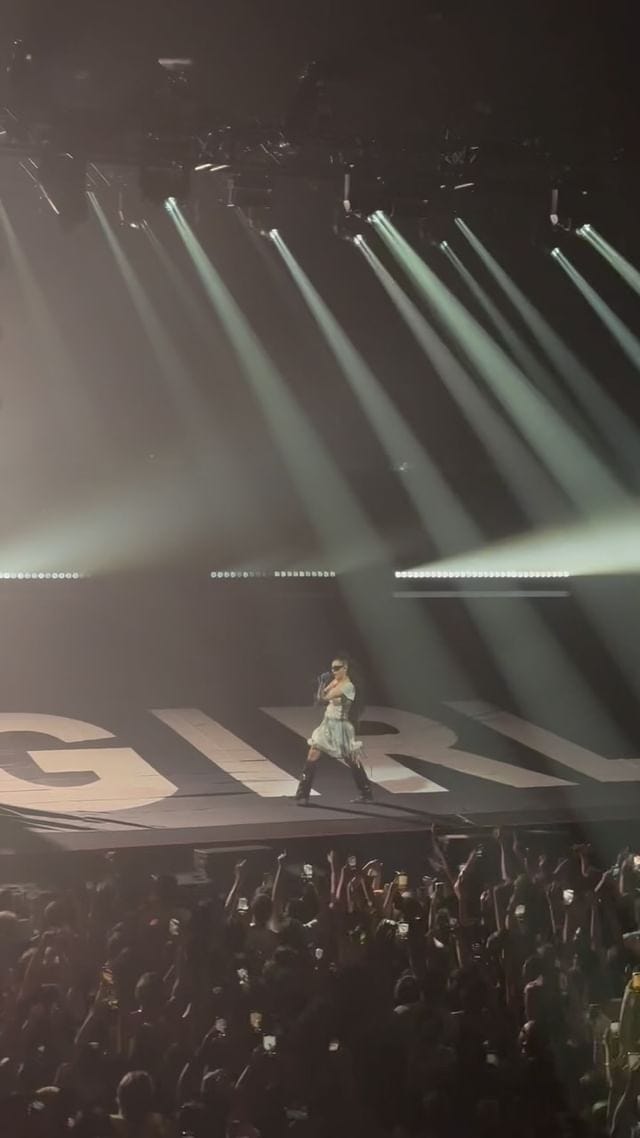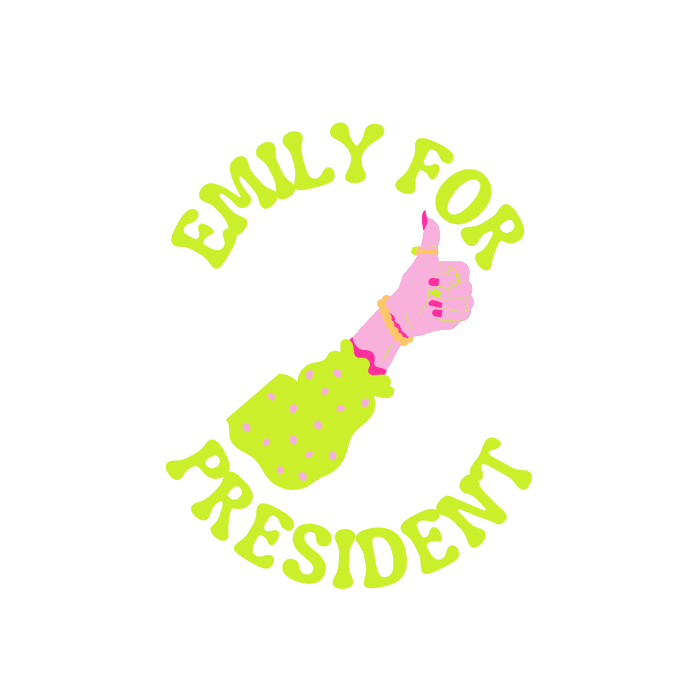Brat and it’s the same but Brady and Emily are on it so it’s not
I fucking love your professional trauma, you whore!!!!
This post is too long to appear in full in your inbox. I don’t know where it will cut off in the email version, but it will be available online. See you there!!!
While writing today’s piece, The Cut put out an article titled “My Job Was My Life. Then I Got Fired.,” with a subheadline that read, “How failure changed my relationship to work.” It felt a bit like an omen—whether good or bad is up for interpretation—given the iterations of today’s conversation that took place both on- and offline.
For one thing, the piece’s author and former Teen Vogue executive editor Samhita Mukhopadhyay writes that it is “extremely challenging to disconnect from the work or not get upset if it’s going poorly. Work can’t make you happy, sure, but when it makes you actively unhappy, it is awful” (X). Spoiler alert: my guest and I unpack that exact experience here today.
I think a lot about work and my career trajectory up to this point. I know I’m not alone in that, as Mukhopadhyay’s piece proves, but I wanted to channel all this thinking somewhere productive. My only regret with this conversation is that I didn’t have it sooner because, despite its occasional heaviness, the sheer act of it was healing in many ways for me—I’m hoping that’s the case for my guest as well.
This week, I’m joined by THEE Brady Goodman-Williams to talk about the twists and turns of his career, the less savory mentalities it instilled in him that he’s trying to work through, and why this Pride is especially meaningful after five fairly tumultuous years.
Brady is a 26-year old attention whore living in Beverly Hills who’s obsessed with glitter and sparkles. He loves to play dress-up, do his makeup, and post thirst traps on Instagram. He takes pride in living an authentic queer life, surrounded by fashion, music, art, and entertainment. He’s very single, but daydreams of marrying a wealthy man so he never has to work again.
And I Couldn’t Help But Wonder…Was I Everywhere? Was I Julia?
The year was 2018 and I was what two therapists would later call “not in a great place mentally.” I was trying anything, desperately, to feel better again, and that’s how I ended up covered in glitter on the rooftop of an apartment building in Flatiron.
It was my first ever Pride, and it’s still one of my favorite memories to half-remember.
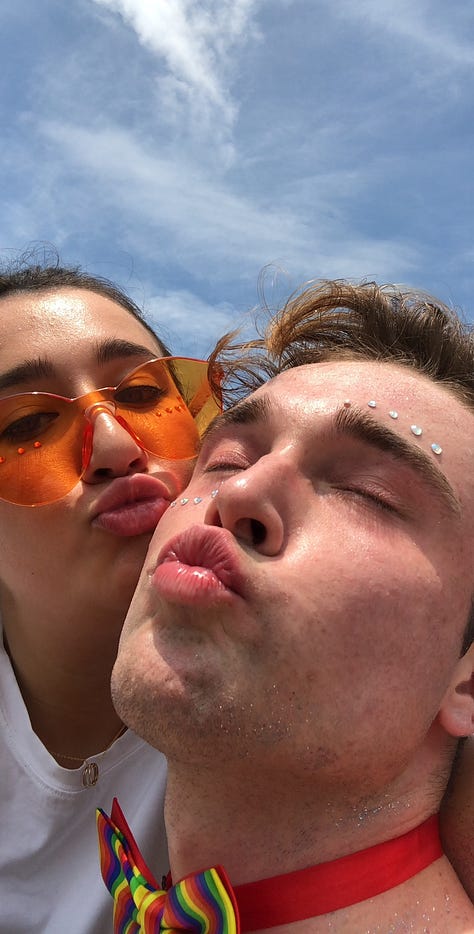
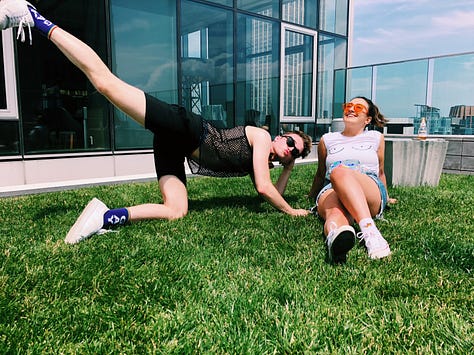
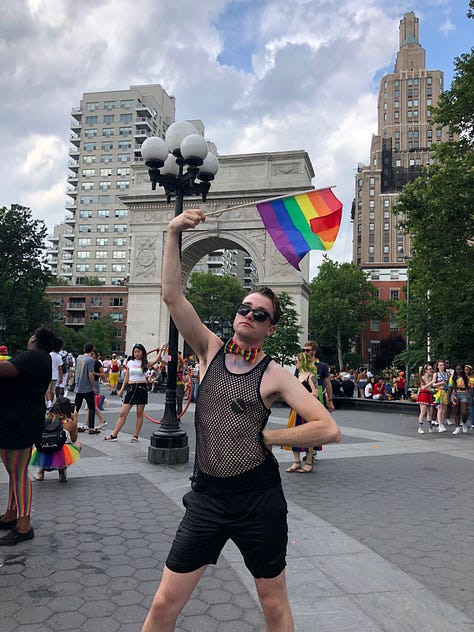
I trailed Brady across the city that day like an eager heterosexual puppy (more commonly known as a hag), going down to Washington Square Park Chipotle and then back uptown to someone’s friend’s friend’s pied-à-terre Five Guys. You could have told me he was the Grand Marshal that year and I would have believed you because everyone I met that day either loved Brady or fell in love with him on sight.
The thing about Brady is that he is the life of the party—which party is irrelevant—and so before we launched into a more reflective and mature conversation, I couldn’t help but have a little silly goofy fun:
Emily: Hi gay! Are you gay?
Brady: Oh honey, too gay to function. So gay, in fact, that I almost dyed my hair green when Charli xcx released the Brat album. So gay, in fact, that my Instagram bio is, “Just a registered Emotional Support Twink™️.” So gay, in fact, that I’m attracted to men (ew).
Stay tuned for Brady’s inevitable visit in which I explicitly ask him to promote the gay agenda. Until then, I wanted to dive into this conversation by asking:
Emily: What are you currently doing for work and do you like it?
Brady: A couple of months ago, I started a new position as the Content Manager at DoLA, one of the largest events marketing platforms highlighting all of the fun things to DO around Los Angeles. I singlehandedly manage the website, socials, editorial strategy, and calendar listings, and also write a daily newsletter that tens of thousands of Angelenos read every day (c’mon 40% open rate).
I don’t like my job—I love my job. I’m literally paid to attend and write about concerts, parties, food and wine festivals, hiking trails, and anything else I dream up. This is the first job I’ve ever held where I genuinely wake up every morning excited about the work I’m doing, and I can finally bring my full authentic self to my workplace.
Emily: Can you briefly walk me through your career since graduating? How has everything you've done professionally led you to where you are now?
Brady: My career over the past five years feels like one giant pinball game, bouncing from one thing to the next. Hi, it’s me, the Gay Pinball Wizard, and I have commitment issues.
I graduated Summa Cum Laude from Emory University in 2019 with a business degree. Although very proud of myself, I struggled with burnout from that cutthroat academic environment. While my peers accepted six-figure consulting and finance jobs, I pursued an act of anti-conformist rebellion and applied for a working holiday gap year visa in Australia.
After first spending the summer back home in Denver working the front desk at a cannabis dispensary for $11.50 an hour (to be honest…best job ever), I packed two bags and moved to Melbourne. While there, I freelanced remotely for a PR agency based in LA where I had previously interned, managing a couple of Australian client accounts and big events. All the pieces seemingly slid into place. I was hustlin’. But then March 2020 hit and my whole world was turned upside down. Events were canceled. We lost a bunch of clients. My salary was cut in half.
Not even a full year after graduating, I applied for pandemic unemployment assistance, which demolished my fragile ego. By September, I realized that it was time to give up on my Australian gap year fantasy. Lost and disillusioned, I impulsively moved to LA that December with hopes that the California sunshine could heal me.
Disappointed by the leadership at that PR agency and the superficiality of the public relations industry in general, I jumped ship and tried being an assistant to a realtor for six months. Liked the work, but hated my boss. Then joined a real estate PR agency. Liked the company, but hated the pay scale. Then I randomly stumbled into an account executive role at a recruiting agency. Liked earning crazy commissions, but hated going into a corporate office five days a week with never-ending drama.
Uninspired and once again completely burnt out, the CEO let me go on good terms last May so that I could figure out what I want to do with my life (which was the question that took me to Australia in the first place).
I spent nine months unemployed, living off unemployment and driving Uber Eats to supplement. I landed a part-time contract with DoLA in October to help launch Gay DoLA, their LGBTQ-focused sister site, which finally helped me get my spark back. That contract turned into a full-time role this past February and now, five years later, I feel like I’m finally on the right track.
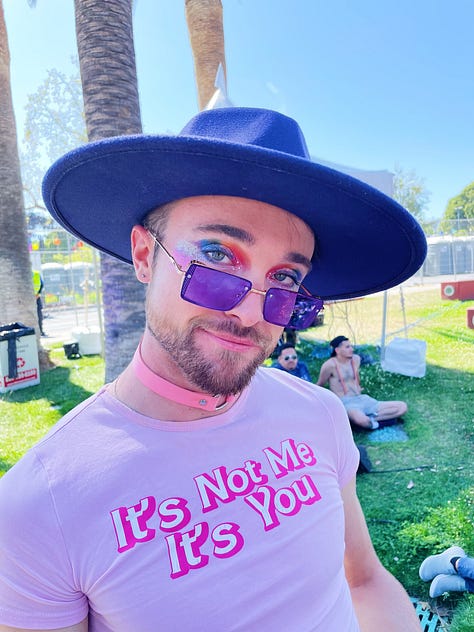
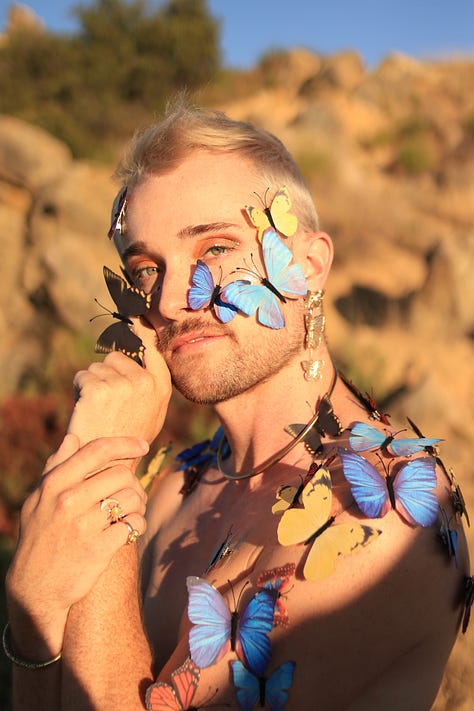
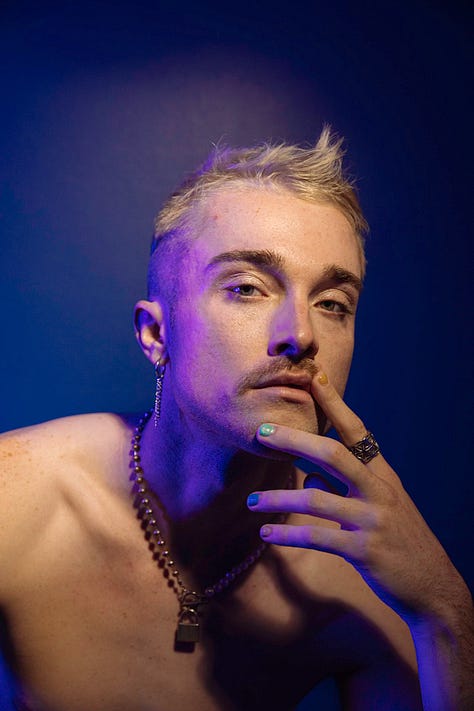
There is a clip from American Idol that is a cornerstone of my and my friends’ daily lexicon. In it, a young man named Noah Davis is auditioning. After Lionel Richie expresses awe that he is only 18 years old, Davis clutches his chest and says the now-iconic line, “Wig.” To which Katy Perry responds, a little too eagerly, “Wig?? Did you just say wig???” Richie and Luke Bryan are confused but it’s no matter, as Perry tells them, “It’s not your language. It’s just for us.”
I say all this as a means of explaining my language for the next question. You may not understand what I’m asking, but that’s because it’s just for us. What is for everyone is Brady’s response because it’s the segway into the next part of our conversation:
Emily: Are you a brat when you’re bumping that?
Brady: I’m everywhere I’m SO Julia.
The funny thing about being a brat is that no matter how good your life is, you’ll always find something to complain about. It’s just in my nature. My bratty outlook on life comes from a deep-rooted sense of perfectionism. And most of the time, it serves me well—I demand what I want and don’t settle for less.
But when my mental health isn’t strong, that brattiness can feel like a symptom of anxiety and depression, shortening my temper and causing me to beat myself up for all the perceived imperfections in my life. I literally get free Coachella tickets (with backstage access), interview celebrities, and have VIP access to most venues around town just to record concert videos, but I’m still stressed about how low my salary is.
It would be so confusing if only 82% of people didn’t feel the same.
Imposter Syndrome is in the Eye of the Beholder
Whenever I write about working or the absence of it (read: hobbies), I think back to Sandra Etuk’s seminal conversation about working jobs we don’t love as a means of paying for the lives we do under capitalism. I don’t have a perfect theory worked out for it just yet but I think about this dynamic a lot in relation to imposter syndrome, which Psychology Today explains is the belief that one is
undeserving of their achievements and the high esteem in which they are, in fact, generally held. [Individuals with imposter syndrome] feel that they aren’t as competent or intelligent as others might think—and that soon enough, people will discover the truth about them.
Imposter syndrome isn’t inherently a learned mentality but when we find ourselves in environments that don’t align with who we are, there’s a base level of disconnect between our work and how we perceive ourselves in relation to it. It becomes easier, then, when we endure experiences in the workplace like Brady has, to internalize the worst beliefs about ourselves and carry them with us, even when we move on to other roles and companies.
Yet, there is mixed reporting on the prevalence of imposter syndrome. Some places report Gen Z and Millennials experience it at higher rates than previous generations, while others claim that Gen Z doesn’t feel imposter syndrome nearly as much as any generation before us because of our exposure to technology and information.
I was curious about Brady’s perception of all of this, so I asked:
Emily: How have your past experiences with working shaped certain mindsets you still hold onto now in a job that does support and satisfy you?
Brady: Cheers to all the girls, gays, and theys who have survived toxic work environments! It’s hard to pinpoint what specifically makes a workplace toxic, but like any trauma, your body knows when it’s happening. You’ll wake up every workday morning dreading getting out of bed. You’ll sweat uncontrollably when you hear the Slack notification sound. You’ll casually tell your friends stories about your boss or coworkers and once they pick their jaws up off the floor they’ll not-so-gently encourage you to quit that job (or, in some cases, pursue legal action).
My first job out of college was not only toxic but borderline abusive. I’ll never forget being at a work retreat when my boss threw shampoo bottles at my head. Or when she asked all of my coworkers behind my back if they thought I was high on drugs at a work event. Or when she deducted $600 from my paycheck to repair the front bumper of her car. Or when she applied for pandemic paycheck protection loans, cut all of our salaries literally in half, and bragged about paying off her student debt. Like many individuals who experience abuse, I left one toxic situation for another. My next boss belittled me every chance she had, going out of her way to make me feel small.
My whole life I’ve always felt like I need to prove myself, both personally and professionally. So when I found myself in these toxic work environments—which prey on people who struggle with feeling inadequate—I ended up blaming myself for a long time. It’s taken me years of therapy to find my own sense of self-worth in the workplace again, and I still struggle with it sometimes.
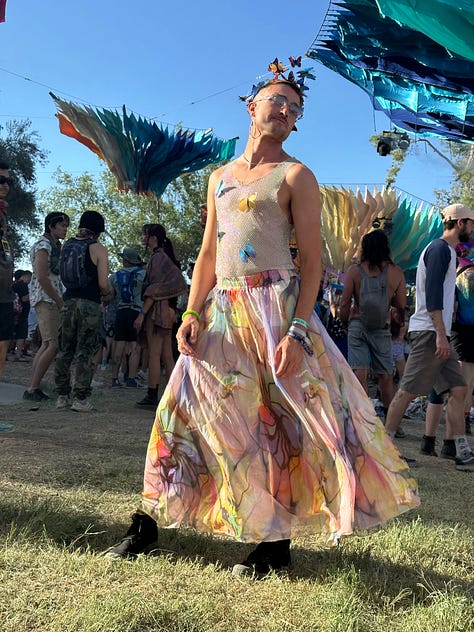
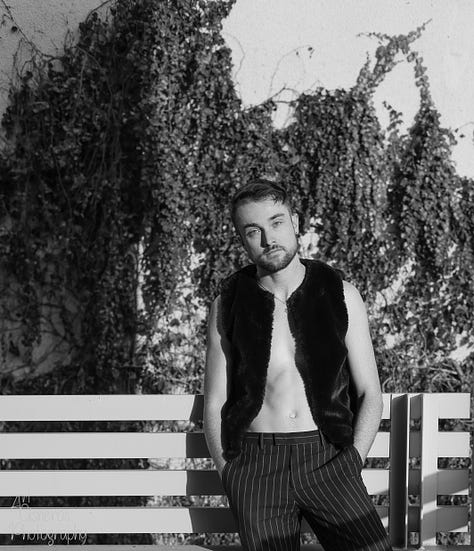
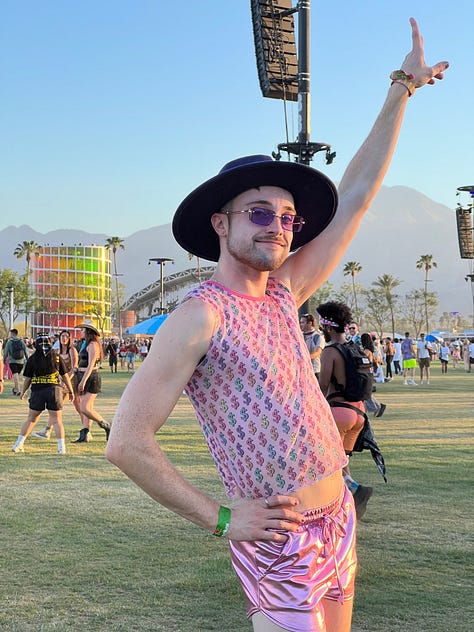
Emily: You've said that you still experience imposter syndrome at work despite feeling like this is the job you were made to have. To what degree do you think that's symptomatic of how our society views working and labor?
Brady: Honestly, I’m working my dream job right now but the salary is about a third of what my college classmates are earning. Oftentimes I feel embarrassed about that. So even though I’ve worked extremely hard to find happiness in my professional life, there’s still this inner critic in the back of my mind that tells me I’m inferior. Our society tells us that earning money is the most important thing; my lived experience says otherwise.
Consciously I know that life isn’t a race and it certainly isn’t a competition, yet I still don’t feel fully settled in my job because I’m afraid of “falling behind.” So clearly those societal messages are deeply rooted in my subconscious, especially because I spent my entire adolescence defining myself as an over-achieving straight-A student. We are worth so much more than our grades or our tax brackets, but it’s a daily exercise for me to remember that.
When I was unemployed, I got into the habit of doing this one thing on the days that didn’t feel expressly hopeful. I would lay in my bed in my pajamas and I would scroll through my connections on LinkedIn, reading through everyone’s headlines. It was my brain’s favorite way of kicking itself while it was down—look at all of these people you personally know who are doing amazing things like going to law school or who have already achieved a managerial role and your dumb ass is still in bed in a Hannah Montana meme shirt…pathetic.1
I share this not for sympathy (or pity, even) but as a peek into the mind of someone who was not able to remind themselves that we are all so much more than our jobs and career trajectories. I had no idea what was going on in the majority of these individuals’ lives but I assumed that, by default, they were all better than mine. Looking back on that now, that logic makes no fucking sense. Everyone’s lives were better than mine because…of a job? Because I wasn’t participating in the economy at my highest potential (sorry Dad)? Because my employment equaled my worthiness?
If I am to show my former self some kindness, a lot of that mentality stemmed from (and, to be truly candid with all of you, still stems from) jealousy. I was and am jealous that everyone had seemingly figured something out that I hadn’t and, as a result, was succeeding in a way I wasn’t.
I think that’s because it was, at least to me, always implicitly implied at Emory that by being there, you were setting yourself up for complete success. No one I knew talked frankly about what life could look like post-grad if you didn’t have a job at any point—that wasn’t a possibility, it seemed. I know losing a job and being unemployed is up there as one of the least unique experiences, but it wasn’t something I knew how to talk about with others—lest I reveal that I had failed at something that was all but certain.
I recently spoke with someone finishing their first year at Emory who sought me out for career advice (you can laugh—I did). While I couldn’t help them network in my current industry any more than I could help myself, we did talk about this exact thing and how there is not really any support in highly competitive environments like that at our school. They had just gotten rejected from a summer internship before getting on the phone with me and were nervous that meant they wouldn’t have something highfalutin on their resume.
I earnestly told them that I wish I had had more exposure to failure—or at least more conversations about it—prior to losing my job but that I was glad it had happened this early in my life and career. It was the first time I said that out loud and meant it. I was actually happy for all the lessons I had learned and the person I’ve become since it happened.
The freshman didn’t understand the significance of the moment and went on to tell me about the other internships they had applied to. Nevertheless, the interaction made me wish I had been confident enough sooner to talk about it with people like Brady, as well as the conversations I wished I had had with my peers with the good LinkedIn headlines to let them know “failure” isn’t as scary as I once believed it to be.
With that, I wanted to ask him:
Emily: What has been your experience like with people who might not have had any turbulence at this stage in their career?
Brady: The question isn’t so much about my experience with them, but their experience with me. I’d be lying if I said I didn’t feel jealous of my friends who chose corporate paths after college, or went to medical school, law school, etc.
They make so much more money. They get to travel, buy expensive clothes, and live without roommates. Sure, they might be working 60 hours a week, but they have a 401(k). Their life is planned out for them. When I was struggling with my job, that jealousy quickly turned into resentment, which put a strain on a lot of my relationships.
If comparison is the thief of joy, then it can also rob us of love, connectedness, and collaboration by alienating ourselves from those who love us and want to help us succeed.
Emily: How can we show more kindness to our friends who are struggling with work when we can't relate?
Brady: This might sound wild, but I think we need to support our friends professionally in the same way we would when they’re going through challenges in their romantic life. When I’ve struggled with work, I’ve forgotten that there’s “plenty of other fish [jobs] in the sea,” which meant I stayed in roles for far longer than I should have. My friends constantly remind me to advocate for my needs in my love life, so I could use that same advice when I’m not getting my needs met at work.
When your friend loses their job, bring them a pint of ice cream like you would when they go through a breakup, and be a shoulder to cry on. Remind them that capitalism is the problem, not them. Although a job will never love us back, we often invest the same amount of energy (if not more) into our 9-to-5’s, which means there’s a certain emotional connection there that often gets overlooked.
Comparison comes easily but compassion without the sly thought of, “Well, at least that’s not me” is near fucking impossible. And yet, maybe that’s the exact thing we—you, me, my grandma reading this—all need to adopt. Perhaps a core argument here at E4P, today and in general, is to operate under the Harry Styles model of behavior and truly just treat people with a bit more kindness.2
Be Gay, Do Crime a Good Job At the Office
Despite oversharing in the last section, I still couldn’t move my mind from wondering what “success” actually looks like to my generation. Is it based on attaining a certain salary by a certain age? Is it based on a title, a milestone, or even a lack of something, like a loss of any kind?
The most comprehensive answer I could find comes from a 2022 report the consulting firm EY published based on their findings from a 25-person Gen Z panel. In it, they found the five key things that define Gen Z’s approach to professional success:
Gen Z wants to enjoy what they do. At least, they don’t want to hate getting out of bed.
Gen Z doesn’t have to be the best, but they want to do their best.
Gen Z wants to make an impact, even if it’s small or indirect.
Gen Z requires enough income to be comfortable.
To Gen Z, it doesn’t matter if others admire what they do. It matters more what they think of themselves (X).
We could do an entirely different piece just on how accurate this list is but rather than derail one conversation at hand for another, I wanted to refocus the lens on Brady by asking:
Emily: How do you view success today and how has it changed throughout your life?
Brady: For me, success has always been synonymous with freedom. Growing up, I felt successful because I was the “smart” kid. I could ace almost any test, and got near-perfect grades, so the teachers trusted me. That work ethic gave me the freedom to avoid any challenges I might have been experiencing with my family life at home (a story for another time).
This carried over into high school, where I discovered that I could get much farther in life with my Charisma, Uniqueness, Nerve, and Talent than just grades alone. I was elected Student Body President, which meant people actually liked me. This gave me the courage to come out of the closet as gay, breaking whatever chains (real or perceived) were holding me back—the ultimate freedom. I used this momentum to earn several full-ride merit college scholarships, which brought me physical freedom—leaving my hometown and moving to Atlanta. The world was my oyster.
But once I got to college, things got complicated. Success was all about money. At Emory I was surrounded by insane wealth in a way that I didn’t experience in my suburban Denver upbringing. New Yorkers with private jets would fly off to Turks & Caicos for Spring Break.
I’m grateful that I received a decent chunk of money from my grandpa once I turned 18 (what would have been my college savings fund had I not earned a full-ride scholarship), which thankfully has allowed me to be financially independent ever since. However, I stopped feeling successful because everyone had more and I noticed all of the things I lack. I ended up in business school because I thought that would ensure I’d earn more money (wrong).
Even though I have full autonomy over my life and its direction, I still struggle with feeling unsuccessful, largely because I don’t feel as free as I did when I was a kid. Adulthood is a trap. We have rent and bills to pay. We need insurance. We have responsibilities. I’m closer to 30 than I am to 21, and our hetero-dominant society makes me think I need to “settle down” soon. This narrative doesn’t really apply to queer lifestyles, but it’s hard to shake when I see my straight friends getting married and having kids on Instagram.
And yet, the only obstacle in the way of me chasing my dreams is my own limiting beliefs.
Lest you thought the Pride mention at the top of the piece was a fluke or E4P’s very own attempt at rainbow washing, trust that today’s chat is part of our regularly scheduled queer programming. Brady’s identity is more essential to who he is in the world than his profession, so I wanted to know:
Emily: Has your queerness been a driving force in how you've built your life and identity, both professionally and personally?
Brady: 1000%. Queer people spend the majority of our lives feeling like outsiders. Some queer people can navigate the world as “straight passing,” meaning that they can walk down the street or enter a room without immediately drawing attention to their queerness.
I am absolutely not straight passing. People deduce that I’m queer as soon as I open my mouth, which can lead to feeling very vulnerable and exposed during job interviews or salary negotiations, for example. So as a result, I’ve both directly and indirectly shaped my life trajectory in search of environments where I’m not the token gay man in the room.
It wasn’t until I moved to LA three and a half years ago that I finally found my chosen family of queer friends, who made me see my queerness as a strength instead of a weakness. Now, at age 26, I know that I want to shape my career around my queerness, working in advocacy and creative spaces that make it easier for other members of the LGBTQ+ community to see their queerness as a strength too.
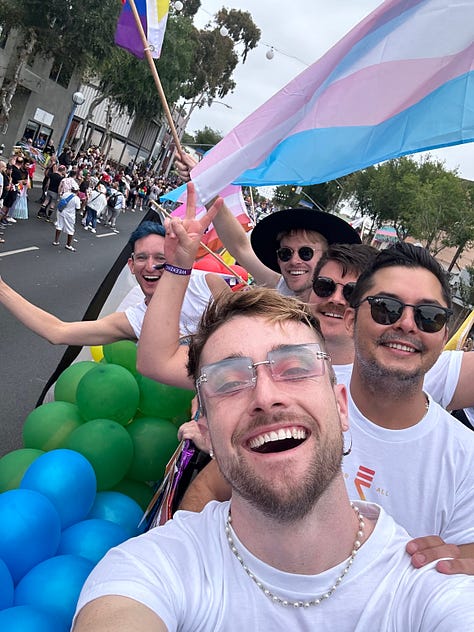
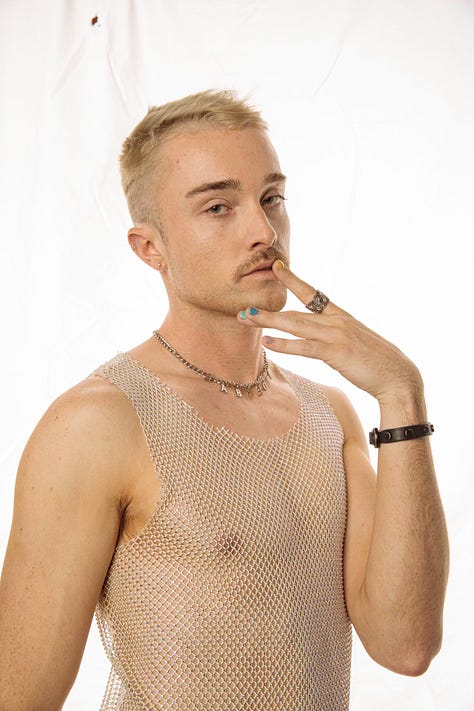
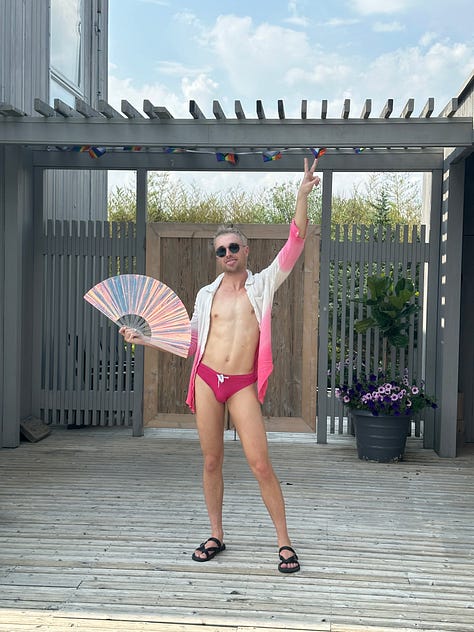
Emily: Were you ever at odds with your queerness or is it something that has always served to as a source of internal strength?
Brady: It took me a really long time to see my queerness as a strength. When you spend the better part of your childhood lying to both yourself and others, it’s hard to kick that shame. But once I did, the world opened up to me. The white picket fence American Dream force-fed to us in mainstream media isn’t for me.
In the wise words of Charli xcx, “I don't wanna go to school / I just wanna break the rules / Boys and girls across the world / Putting on our dancing shoes / Going to the discotheque / Getting high and getting wrecked / I don't wanna go to school / I just wanna break the rules.”
My queerness helped me rebel against the messages instilled in me by conservative family members. I literally got to break free from the expectations forced upon straight men. I can start a family at any age (or choose not to have kids, and not be judged for it). I can wear eyeshadow and heels and kaftans and glitter and sequins and skirts and kiss as many boys as I want!
In many ways, queer people spend their whole childhoods trapped in a cage but are usually allowed to break out of it when they grow up. Straight people don’t get that luxury. I honestly feel bad for straight people
all the timesometimes.
Emily: What does Pride Month mean to you?
Brady: This Pride Month is really special to me actually because of what I’m doing for work. My job description is to literally go around town and document living my LA life. As a result, I’ve been able to shine a spotlight on both West Hollywood Pride and LA Pride, two of the largest pride festivals in the country.
Riding the Pride Parade route with my friend Tony, who’s the Executive Director of Equality California, was extra meaningful because I got to share it with 98k Instagram followers. Not surprisingly, all of the queer content I’ve posted this month has elicited some homophobic DMs, and we’ve actually lost followers.
F*ck ‘em. It’s cool that now I have a platform to push my own gay agenda.
Brady and I talked briefly about what our lives look like now compared to how we expected them to be when we were younger. In the Charli xcx vein that has served as a through line throughout this piece,3 I can’t help but make a comparison here to “I think about it all the time.” As I see it, the tension at the center of the song which makes me cry every time I listen to it, Charlotte you witch is how much of our lives should we plan for and how much of it should we live, and, above all, how will we know we made the right choice either way?
If you had told me five years ago anything about how my life looks today, I think I would have unhinged my jaw and just started screaming. That’s honestly the only adequate reaction to how many parts of my reality are equally far better and far worse than I envisioned in 2019. But even now, I can’t tell you which choices I made that got me here were right, wrong, or simply happy accidents that fell into my lap. Maybe that’s not the point and I’m waxing poetic up the wrong tree.
In any case, I think about it all the time, and while I’m curious if Brady does too, I thought it would be more interesting to end today’s piece by asking:
Emily: What would you tell Brady From College about your life right now?
Brady: You’re still in a cocoon. Five years from now, you’ll be a butterfly. Growth takes time. Don’t just trust the process, but trust yourself to handle life’s curveballs. By intentionally taking the road less traveled, your story will be more complicated and confusing. But no risk, no reward.
Thank you a million times over to Brady for joining me today, and for knowing me at my worst and still being my friend through it all. I wish you nothing but the brattiest summer ever. Now, be free, and go spring breakers.
I want to clarify the meme shirt was not the pathetic part of this experience. The meme shirt is, in fact, a gift to this world and it is a prized possession of mine.
Happy brat to all who celebrate.





